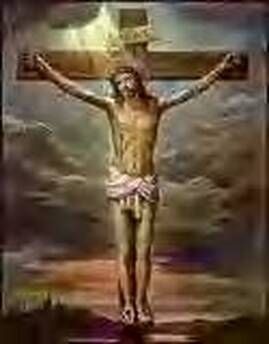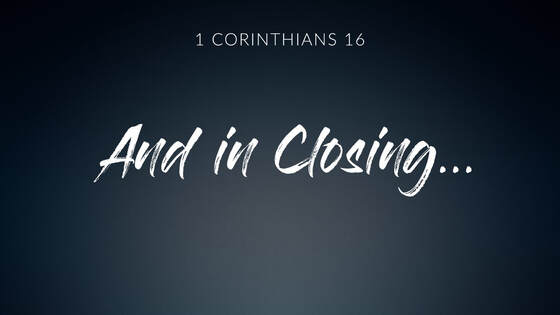1 Corinthians 16:1-24
Lesson 339
Read both the "King James Bible" and the "New Living Translation."
In this lesson:
Valuable deeds and Paul's final instructions.
Paul's travel plans (16:5-9).
"Stand fast in the faith" (16:13).
Conclusion and benediction (16:13-24).
Valuable deeds and Paul's final instructions.
Paul's travel plans (16:5-9).
"Stand fast in the faith" (16:13).
Conclusion and benediction (16:13-24).
Who was -
Timothy -
A disciple of Christ, a Christian minister, Paul's protégé, an evangelist, and a prominent leader in the early church from the city of Lystra (in modern-day Turkey). Timothy (one who honors God) was also known as Timotheus. He was the son of a Jewish mother (Eunice) and a Gentile father (Acts 16:1-3). Timothy studied The Old Testament as a child (2 Timothy 3:15) and converted to Christianity with his mother and grandmother Lois (2 Timothy 1:5) during Paul's first visit to Lystra. Shy by nature and plagued by illness (1 Timothy 5:23), Timothy was well thought of by Christians (Acts 16:2). He was like a son to Paul (Philippians 2:22; 1 Timothy 1:2; 1:18; 2 Timothy 1:2; 2:1) and accompanied him on the second and third missionary journeys (1 Corinthians 16:10). Timothy was with Paul when he wrote 2 Corinthians (2 Corinthians 1:1), Philippians (Philippians 1:1), Colossians (Colossians 1:1), and Philemon (Philemon 1:1), and helped him found the church in Philippi (Acts 16:11-12). Acts 19:22, 1 Thessalonians 3:1-10, and 1 Corinthians 4:17 record how Paul sent Timothy to Macedonia, Thessalonica, and Corinth to stabilize their struggling churches. Later, the aging Paul addressed the epistles 1 Timothy (1 Timothy 1:2) and 2 Timothy (2 Timothy 1:2) to him, and it was the loyal Timothy who traveled to Rome to visit the imprisoned Paul. Imprisoned and then released himself (Hebrews 13:23), Timothy was devoted to Jesus Christ, committed to the welfare of others (Philippians 2:20), and spent his life spreading the word of God.
Apollos -
Born in Alexandria, Egypt, Apollos was a Jew, scholar, gifted public speaker (Acts 18:24-26), missionary, teacher, and a friend of Paul's. Apollos preached in Corinth (Acts 19:1) and helped expand the church started by Paul (1 Corinthians 3:6). Tutored by Aquila and Priscilla, his powerful speaking style made Apollos so popular in Corinth that some Christians began to follow him instead of Christ. Rather than being flattered, this made Apollos hesitant to return to Corinth (1 Corinthians 16:12). Paul relied on Apollos and asked for his assistance in Nicopolis (Titus 3:13). Apollos was with Paul in Ephesus when he wrote the "First Epistle to the Corinthians." Many biblical scholars believe Apollos wrote "The Epistle to the Hebrews."
Stephanas -
Stephanas was a member of the Corinth church and one of the first Christian converts in the Achaia Province (16:15). He and his household were baptized by Paul (1 Corinthians 1:16) and "addicted" themselves to ministering to believers (16:15).
Fortunatus -
Means fortunate. Fortunatus was a Christian member of the church in Corinth. His name tells us he was a Roman.
Achaicus -
A Christian from Corinth who helped Paul (16:17).
Aquilla and Priscilla -
Aquila and Priscilla (also called Prisca) were a married missionary couple (Acts 18:2) who befriended Paul. All three supported the ministry by tent-making (Acts 18:3). Aquila and Priscilla helped Paul spread the Gospel and risked their lives for him (Romans 16:3-4), for which he repeatedly thanked them. Aquila was from Pontus (Acts 18:2), a client kingdom of the Roman Empire near the Black Sea. But he lived in Rome until he and Priscilla were driven from their home due to their Christian beliefs. They fled to Corinth, where they met Paul and helped him establish a church. Later, they traveled with Paul to Syria (Acts 18:18) and then to Ephesus on the second missionary journey. In Ephesus, they did missionary work and turned their home into a church (1 Corinthians 16:19). They were eventually allowed to return to Rome, where they once again held church services in their home (Romans 16:5). Some years later, they returned to Ephesus (2 Timothy 4:19).
Timothy -
A disciple of Christ, a Christian minister, Paul's protégé, an evangelist, and a prominent leader in the early church from the city of Lystra (in modern-day Turkey). Timothy (one who honors God) was also known as Timotheus. He was the son of a Jewish mother (Eunice) and a Gentile father (Acts 16:1-3). Timothy studied The Old Testament as a child (2 Timothy 3:15) and converted to Christianity with his mother and grandmother Lois (2 Timothy 1:5) during Paul's first visit to Lystra. Shy by nature and plagued by illness (1 Timothy 5:23), Timothy was well thought of by Christians (Acts 16:2). He was like a son to Paul (Philippians 2:22; 1 Timothy 1:2; 1:18; 2 Timothy 1:2; 2:1) and accompanied him on the second and third missionary journeys (1 Corinthians 16:10). Timothy was with Paul when he wrote 2 Corinthians (2 Corinthians 1:1), Philippians (Philippians 1:1), Colossians (Colossians 1:1), and Philemon (Philemon 1:1), and helped him found the church in Philippi (Acts 16:11-12). Acts 19:22, 1 Thessalonians 3:1-10, and 1 Corinthians 4:17 record how Paul sent Timothy to Macedonia, Thessalonica, and Corinth to stabilize their struggling churches. Later, the aging Paul addressed the epistles 1 Timothy (1 Timothy 1:2) and 2 Timothy (2 Timothy 1:2) to him, and it was the loyal Timothy who traveled to Rome to visit the imprisoned Paul. Imprisoned and then released himself (Hebrews 13:23), Timothy was devoted to Jesus Christ, committed to the welfare of others (Philippians 2:20), and spent his life spreading the word of God.
Apollos -
Born in Alexandria, Egypt, Apollos was a Jew, scholar, gifted public speaker (Acts 18:24-26), missionary, teacher, and a friend of Paul's. Apollos preached in Corinth (Acts 19:1) and helped expand the church started by Paul (1 Corinthians 3:6). Tutored by Aquila and Priscilla, his powerful speaking style made Apollos so popular in Corinth that some Christians began to follow him instead of Christ. Rather than being flattered, this made Apollos hesitant to return to Corinth (1 Corinthians 16:12). Paul relied on Apollos and asked for his assistance in Nicopolis (Titus 3:13). Apollos was with Paul in Ephesus when he wrote the "First Epistle to the Corinthians." Many biblical scholars believe Apollos wrote "The Epistle to the Hebrews."
Stephanas -
Stephanas was a member of the Corinth church and one of the first Christian converts in the Achaia Province (16:15). He and his household were baptized by Paul (1 Corinthians 1:16) and "addicted" themselves to ministering to believers (16:15).
Fortunatus -
Means fortunate. Fortunatus was a Christian member of the church in Corinth. His name tells us he was a Roman.
Achaicus -
A Christian from Corinth who helped Paul (16:17).
Aquilla and Priscilla -
Aquila and Priscilla (also called Prisca) were a married missionary couple (Acts 18:2) who befriended Paul. All three supported the ministry by tent-making (Acts 18:3). Aquila and Priscilla helped Paul spread the Gospel and risked their lives for him (Romans 16:3-4), for which he repeatedly thanked them. Aquila was from Pontus (Acts 18:2), a client kingdom of the Roman Empire near the Black Sea. But he lived in Rome until he and Priscilla were driven from their home due to their Christian beliefs. They fled to Corinth, where they met Paul and helped him establish a church. Later, they traveled with Paul to Syria (Acts 18:18) and then to Ephesus on the second missionary journey. In Ephesus, they did missionary work and turned their home into a church (1 Corinthians 16:19). They were eventually allowed to return to Rome, where they once again held church services in their home (Romans 16:5). Some years later, they returned to Ephesus (2 Timothy 4:19).
Study Tip:
As you read, ask yourself,
"What is the point of this passage?"
"How does it affect me?"
As you read, ask yourself,
"What is the point of this passage?"
"How does it affect me?"




